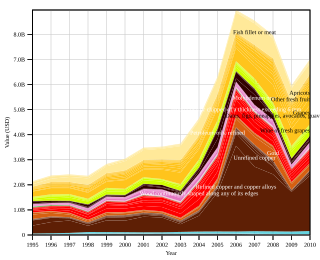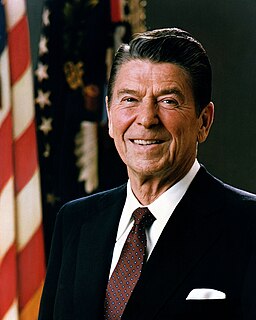The General Agreement on Tariffs and Trade (GATT) is a legal agreement between many countries, whose overall purpose was to promote international trade by reducing or eliminating trade barriers such as tariffs or quotas. According to its preamble, its purpose was the "substantial reduction of tariffs and other trade barriers and the elimination of preferences, on a reciprocal and mutually advantageous basis."

The World Trade Organization (WTO) is an intergovernmental organization that is concerned with the regulation of international trade between nations. The WTO officially commenced on 1 January 1995 under the Marrakesh Agreement, signed by 124 nations on 15 April 1994, replacing the General Agreement on Tariffs and Trade (GATT), which commenced in 1948. It is the largest international economic organization in the world.
The Reciprocal Tariff Act provided for the negotiation of tariff agreements between the United States and separate nations, particularly Latin American countries. The Act served as an institutional reform intended to authorize the president to negotiate with foreign nations to reduce tariffs in return for reciprocal reductions in tariffs in the United States. It resulted in a reduction of duties.
Canada–United States Free Trade Agreement (CUSFTA), official name as the Free Trade Agreement between Canada and the United States of America, is a trade agreement reached by negotiators for Canada and the United States on October 4, 1987, and signed by the leaders of both countries on January 2, 1988. The agreement phased out a wide range of trade restrictions in stages over a ten-year period, and resulted in a substantial increase in cross-border trade. With the addition of Mexico in 1994 FTA was superseded by the North American Free Trade Agreement (NAFTA).
Ratification is a principal's approval of an act of its agent that lacked the authority to bind the principal legally. Ratification defines the international act in which a state indicates its consent to be bound to a treaty if the parties intended to show their consent by such an act. In the case of bilateral treaties, ratification is usually accomplished by exchanging the requisite instruments, and in the case of multilateral treaties, the usual procedure is for the depositary to collect the ratifications of all states, keeping all parties informed of the situation.

The Dominican Republic–Central America Free Trade Agreement (CAFTA-DR) is a free trade agreement. Originally, the agreement encompassed the United States and the Central American countries of Costa Rica, El Salvador, Guatemala, Honduras, and Nicaragua, and was called CAFTA. In 2004, the Dominican Republic joined the negotiations, and the agreement was renamed CAFTA-DR.
The Kennedy Round was the sixth session of General Agreement on Tariffs and Trade (GATT) multilateral trade negotiations held between 1964 and 1967 in Geneva, Switzerland. Congressional passage of the U.S. Trade Expansion Act in 1962 authorized the White House to conduct mutual tariff negotiations, ultimately leading to the Kennedy Round. Participation greatly increased over previous rounds. Sixty-six nations, representing 80% of world trade, attended the official opening on May 4, 1964, at the Palais des Nations. Despite several disagreements over details, the director general announced the round’s success on May 15, 1967, and the final agreement was signed on June 30, 1967—the very last day permitted under the Trade Expansion Act. The round was named after U.S. President John F. Kennedy, who was assassinated six months before the opening negotiations.
The International Trade Organization (ITO) was the proposed name for an international institution for the regulation of trade.
The United States-Colombia Trade Promotion Agreement (CTPA) is a bilateral free trade agreement between the United States and Colombia. Sometimes called the Colombia Free Trade Agreement, it was signed on November 22, 2006, by Deputy U.S. Trade Representative John Veroneau and Colombian Minister of Trade, Industry, and Tourism Jorge Humberto Botero. CTPA is a comprehensive agreement that will eliminate tariffs and other barriers to trade in goods and services between the United States and Colombia.
The fast track authority for brokering trade agreements is the authority of the President of the United States to negotiate international agreements that Congress can approve or deny but cannot amend or filibuster. Renamed the trade promotion authority (TPA) in 2002, fast track negotiating authority is an impermanent power granted by Congress to the President. Fast track authority remained in effect from 1975 to 1994, pursuant to the Trade Act of 1974, and from 2002 to 2007 by the Trade Act of 2002. Although it technically expired in July 2007, it remained in effect for agreements that were already under negotiation until their passage in 2011. The following year, the Obama administration sought renewal of TPA, and in June 2015, it passed Congress and was signed into law by the President. Known as the Trade Preferences Extension Act of 2015, the legislation conferred on the Obama administration "enhanced power to negotiate major trade agreements with Asia and Europe."

The China–Australia Free Trade Agreement (ChAFTA) is a bilateral Free Trade Agreement (FTA) between the governments of Australia and China. Since negotiations began, 21 negotiating rounds have been completed. The deal was completed on 17 November 2014 and details released two days later, nearly 10 years after its first round of negotiations that began on 23 May 2005 after a joint feasibility study. The free trade agreement was signed between the two countries on 17 June 2015. Following the usual treaty making process the agreement came into force on 20 December 2015, after the Chinese Government completed its domestic legal and legislative processes and the Australian Parliament’s Joint Standing Committee on Treaties and the Senate Foreign Affairs, Defence and Trade References Committee finished a review.

The Treaty Clause is part of Article II, Section 2, Clause 2, of the United States Constitution, that empowers the President of the United States to propose and chiefly negotiate agreements between the United States and other countries, which, upon receiving the advice and consent of a two-thirds supermajority vote of the United States Senate, become binding with the force of federal law.
The Trade Act of 2002 granted the President of the United States the authority to negotiate trade deals with other countries and gives Congress the approval to only vote up or down on the agreement, not to amend it. This authority is sometimes called fast-track authority, since it is thought to streamline approval of trade agreements. This authority makes it easier to negotiate deals, which engenders both support and opposition, opposition coming from labor and environmental groups.

The United States-Chile Free Trade Agreement is a free trade agreement between the United States and Chile signed on June 6, 2003. The pact came into force on January 1, 2004. On that date, tariffs on 90% of U.S. exports to Chile and 95% of Chilean exports to the United States were eliminated. The agreement also established that Chile and the U.S. will establish duty-free trade in all products within a maximum of 12 years (2016). In 2009, bilateral trade between the United States and Chile reached US$ 15.4 billion, a 141% increase over bilateral trade levels before the U.S.-Chile FTA took effect. In particular, U.S. exports to Chile in 2009 showed a 248% increase over pre-FTA levels.

The Outer Continental Shelf Transboundary Hydrocarbon Agreements Authorization Act is a bill that would approve a February 20, 2012 agreement between the United States of America and Mexico about the development of oil and gas natural resources in the Outer Continental Shelf in the Gulf of Mexico near where the two countries share a border. The bill also establishes some of the rules and procedures for enacting this treaty. It was introduced into the United States House of Representatives during the 113th United States Congress.

The Madrid Conference of 1991 was a peace conference, held from 30 October to 1 November 1991 in Madrid, hosted by Spain and co-sponsored by the United States and the Soviet Union. It was an attempt by the international community to revive the Israeli–Palestinian peace process through negotiations, involving Israel and the Palestinians as well as Arab countries, including Jordan, Lebanon and Syria.

Georgia – Hong Kong relations are bilateral relations between Georgia and Hong Kong.
Hong Kong–Maldives relations refer to foreign relations between Hong Kong and the Maldives.
The European Union's (EU) Common Commercial Policy or EU Trade Policy is the policy whereby EU member states delegate authority to the European Commission to negotiate their external trade relations, with the aim of increasing trade amongst themselves and their bargaining power vis-à-vis the rest of the world. The Common Commercial Policy is logically necessitated by the existence of the Customs Union, which in turn is also the foundation upon which the Single Market and Monetary Union were later established.











